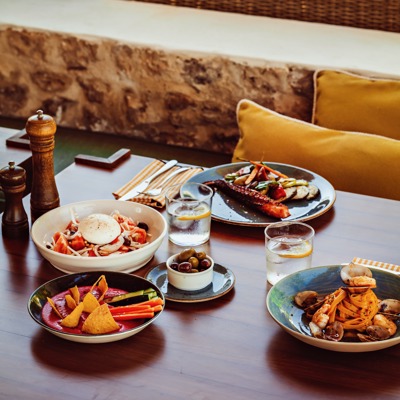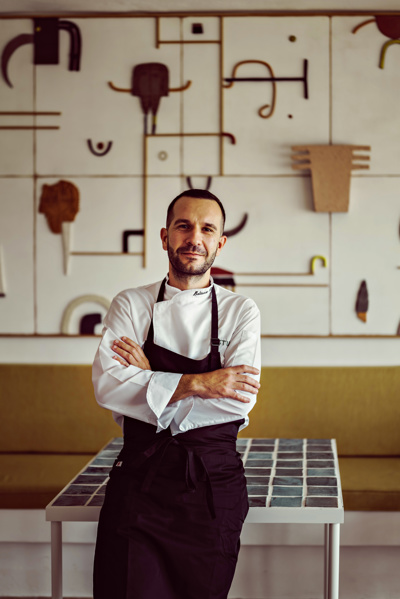QUICK FIRE QUESTIONS
If you could only eat one food for the rest of your life, what would it be?
Eggs.
Which dish do you make for your friends when they come round for dinner?
Black suckling pig with grouper, a Mallorcan recipe.
If you met someone who had never tasted Spanish cuisine, which dish would you impress them with?
From Spanish cuisine, I would serve paella. From Balearic cuisine, I would serve caldereta de llagosta, a lobster stew, and typical Menorcan dish.
If you yourself were an ingredient, which one would you be and why?
If I were an ingredient, I would be olive oil, because it’s indispensable in Spanish cuisine; it’s versatile and it always adds a special touch.
Which is your favourite word in the culinary dictionary?
Mise en place (everything in its place).
Are you a night owl or an early bird?
I consider myself an adaptable person: so I’m neither particularly one nor the other. As head chef, I have to be prepared to work at different times based on the demands of the day, and so I can adapt my routine as necessary. But during my free time, I like to get up early to make the most of the day and then go to bed early.
How would you describe your work in one phrase?
My work is demanding, creative, exciting and rewarding, because it allows me to turn each challenge into a unique experience.
Sea, countryside or mountain?
The sea.
What’s your favourite travel destination and your dream destination?
Japan.
One word to finish on:
Passion.
If you could only eat one food for the rest of your life, what would it be? Eggs.
Which dish do you make for your friends when they come round for dinner? Black suckling pig with grouper, a Mallorcan recipe.
If you met someone who had never tasted Spanish cuisine, which dish would you impress them with? From Spanish cuisine, I would serve paella. From Balearic cuisine, I would serve caldereta de llagosta, a lobster stew, and typical Menorcan dish.
If you yourself were an ingredient, which one would you be and why? If I were an ingredient, I would be olive oil, because it’s indispensable in Spanish cuisine; it’s versatile and it always adds a special touch.
Which is your favourite word in the culinary dictionary? Mise en place (everything in its place).
Are you a night owl or an early bird? I consider myself an adaptable person: so I’m neither particularly one nor the other. As head chef, I have to be prepared to work at different times based on the demands of the day, and so I can adapt my routine as necessary. But during my free time, I like to get up early to make the most of the day and then go to bed early.
How would you describe your work in one phrase? My work is demanding, creative, exciting and rewarding, because it allows me to turn each challenge into a unique experience.
Sea, countryside or mountain? The sea.
What’s your favourite travel destination and your dream destination? Japan.
One word to finish on: Passion.








